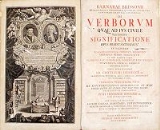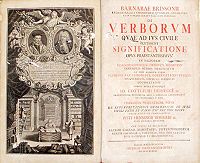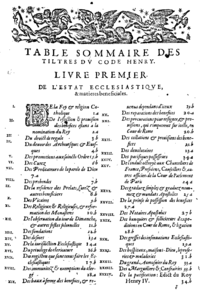
Barnabé Brisson
Encyclopedia
Barnabé Brisson (1531 – 15 November 1591) was a French jurist and politician.
, Vendée, Brisson studied law in Orléans
, Bourges
and finally Poitiers
, where he stayed on as an advocate. Between 1553 and 1556, he moved on to Paris, where he swiftly gained repute for his learning and rhetorical skills.
Charles IX
named him Advocate General
of the Parlement
in 1573. His successor Henry III
, put particular trust in Brisson, who was made first Fiscal
in 1573, promoted to Président à mortier
in 1580, appointed Sixth President of the Parlement in 1588 and entrusted with several diplomatical missions.
As the French Wars of Religion
flamed up again, Brisson remained in Paris as the King fled the city on 16 January 1589. Next day, the Seize ("sixteen"), a group of League
notables that now ruled Paris, installed Brisson as First President of the Parlement in replacement of Achille de Harlay. As a politique
, Brisson sought to mediate between the warring factions. The Seize, however, soon began to mistrust him, because they considered him to remain loyal to Henry. Consequently, they had him sentenced to death by a special court and executed by hanging
in 1591.

 Brisson never held academic office. Despite this, he is – with Contius, Balduinus
Brisson never held academic office. Despite this, he is – with Contius, Balduinus
, Cujacius
, Hotmannus
and Donellus
– among the group of 16th century French jurists that brought Humanist
jurisprudence to its peak.
His principal work is De Verborum Quae ad Jus Civile Pertinent Significatione (1559), a two-folio dictionary of Justinian legal terminology that saw 17 reeditions (often much amended) up until 1805. De Verborum was the standard legal dictionary of the time, and for centuries remained an authoritative source for lexicographers.
Among his other works, the following warrant particular mention. The Code Henri III was an influential 1587 compilation of the laws of France. It saw numerous reeditions, as did Brisson's works on pre-Justinian Roman law
. These include De formulis et solennibus populi Romani verbis, a comprehensive compilation of Roman legal terminology.
Biography
Born as the son of the king's lieutenant in Fontenay-le-ComteFontenay-le-Comte
Fontenay-le-Comte is a commune in the Vendée department in the Pays de la Loire region in France. It is a sub-prefecture of the department.-Geography:The Vendée River flows though the town. The town has an area of .-History:...
, Vendée, Brisson studied law in Orléans
Orléans
-Prehistory and Roman:Cenabum was a Gallic stronghold, one of the principal towns of the Carnutes tribe where the Druids held their annual assembly. It was conquered and destroyed by Julius Caesar in 52 BC, then rebuilt under the Roman Empire...
, Bourges
Bourges
Bourges is a city in central France on the Yèvre river. It is the capital of the department of Cher and also was the capital of the former province of Berry.-History:...
and finally Poitiers
Poitiers
Poitiers is a city on the Clain river in west central France. It is a commune and the capital of the Vienne department and of the Poitou-Charentes region. The centre is picturesque and its streets are interesting for predominant remains of historical architecture, especially from the Romanesque...
, where he stayed on as an advocate. Between 1553 and 1556, he moved on to Paris, where he swiftly gained repute for his learning and rhetorical skills.
Charles IX
Charles IX of France
Charles IX was King of France, ruling from 1560 until his death. His reign was dominated by the Wars of Religion. He is best known as king at the time of the St. Bartholomew's Day Massacre.-Childhood:...
named him Advocate General
Advocate General
An Advocate General is a senior law officer of a country or other jurisdiction, usually charged with advising the courts or Government on legal matters.-India:In India, an Advocate General is a legal adviser to a state government...
of the Parlement
Parlement
Parlements were regional legislative bodies in Ancien Régime France.The political institutions of the Parlement in Ancien Régime France developed out of the previous council of the king, the Conseil du roi or curia regis, and consequently had ancient and customary rights of consultation and...
in 1573. His successor Henry III
Henry III of France
Henry III was King of France from 1574 to 1589. As Henry of Valois, he was the first elected monarch of the Polish-Lithuanian Commonwealth with the dual titles of King of Poland and Grand Duke of Lithuania from 1573 to 1575.-Childhood:Henry was born at the Royal Château de Fontainebleau,...
, put particular trust in Brisson, who was made first Fiscal
Finance minister
The finance minister is a cabinet position in a government.A minister of finance has many different jobs in a government. He or she helps form the government budget, stimulate the economy, and control finances...
in 1573, promoted to Président à mortier
Président à mortier
The office of président à mortier was one of the most important legal posts of the French ancien régime. The présidents were principal magistrates of the highest juridical institutions, the parlements, which were the appeal courts....
in 1580, appointed Sixth President of the Parlement in 1588 and entrusted with several diplomatical missions.
As the French Wars of Religion
French Wars of Religion
The French Wars of Religion is the name given to a period of civil infighting and military operations, primarily fought between French Catholics and Protestants . The conflict involved the factional disputes between the aristocratic houses of France, such as the House of Bourbon and House of Guise...
flamed up again, Brisson remained in Paris as the King fled the city on 16 January 1589. Next day, the Seize ("sixteen"), a group of League
Catholic League (French)
The Catholic League of France, sometimes referred to by contemporary Roman Catholics as the Holy League, a major player in the French Wars of Religion, was formed by Duke Henry of Guise in 1576...
notables that now ruled Paris, installed Brisson as First President of the Parlement in replacement of Achille de Harlay. As a politique
Politique
Politique is a term that was used during the sixteenth and seventeenth century Wars of Religion, to describe moderates of both religious faiths who held that only the restoration of a strong monarchy could save France from total collapse. It frequently included a pejorative connotation of moral...
, Brisson sought to mediate between the warring factions. The Seize, however, soon began to mistrust him, because they considered him to remain loyal to Henry. Consequently, they had him sentenced to death by a special court and executed by hanging
Hanging
Hanging is the lethal suspension of a person by a ligature. The Oxford English Dictionary states that hanging in this sense is "specifically to put to death by suspension by the neck", though it formerly also referred to crucifixion and death by impalement in which the body would remain...
in 1591.
Scholarly work


François Baudouin
François Baudouin , also called Balduinus, was a French jurist, Christian controversialist and historian. Among the most colourful of the noted French humanists, he was respected by his contemporaries as a statesman and jurist, even as they frowned upon on his perceived inconstancy in matters of...
, Cujacius
Jacques Cujas
Jacques Cujas was a French legal expert. He was prominent among the legal humanists or mos gallicus school, which sought to abandon the work of the medieval Commentators and concentrate on ascertaining the correct text and social context of the original works of Roman law.He was born at...
, Hotmannus
François Hotman
François Hotman was a French Protestant lawyer and writer, associated with the legal humanists and with the monarchomaques, who struggled against absolute monarchy. His first name is often written 'Francis' in English. His surname is Latinized by himself as Hotomanus, by others as Hotomannus and...
and Donellus
Hugues Doneau
Hugues Doneau, commonly referred also by the Latin form Hugo Donellus , was a French law professor and one of the leading representatives of French legal humanism ....
– among the group of 16th century French jurists that brought Humanist
Legal humanists
The legal humanists were a group of scholars of Roman law, which arose in 16th century France as a reaction against the Commentators. They had a general disdain for the Middle Ages and felt nothing good could come from then. They also had a great love of antiquarianism and were greatly concerned...
jurisprudence to its peak.
His principal work is De Verborum Quae ad Jus Civile Pertinent Significatione (1559), a two-folio dictionary of Justinian legal terminology that saw 17 reeditions (often much amended) up until 1805. De Verborum was the standard legal dictionary of the time, and for centuries remained an authoritative source for lexicographers.
Among his other works, the following warrant particular mention. The Code Henri III was an influential 1587 compilation of the laws of France. It saw numerous reeditions, as did Brisson's works on pre-Justinian Roman law
Roman law
Roman law is the legal system of ancient Rome, and the legal developments which occurred before the 7th century AD — when the Roman–Byzantine state adopted Greek as the language of government. The development of Roman law comprises more than a thousand years of jurisprudence — from the Twelve...
. These include De formulis et solennibus populi Romani verbis, a comprehensive compilation of Roman legal terminology.

